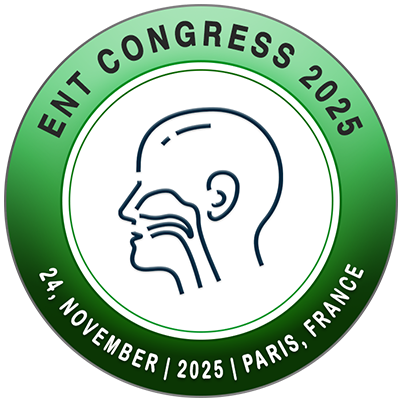
Widad Abdelrahman Ramadan
Altnagelvin Hospital, UKPresentation Title:
Cocaine induced rhinological complications – The Northern Ireland experience
Abstract
Objectives: Anecdotally, ENT and Rheumatology specialists in Northern Ireland have observed a rise in patients presenting with rhinological complications from intranasal cocaine use. This study aims to characterise clinical patterns, investigations, and treatment outcomes of patients with cocaine-induced midline destructive lesions (CIMDL) and levamisole-induced ANCA-associated vasculitis (LIAAV), supporting early diagnosis and the establishment of a regional multidisciplinary team (MDT) pathway.
Methods: A retrospective review of patient records was conducted (December 2024–March 2025) across ENT and Rheumatology departments in Northern Ireland. Demographic data, clinical presentation, serology, imaging, histopathology, treatment strategies, and outcomes were analysed.
Results: Twenty-three patients (median age 37 years, 52% female) were identified. Common presenting symptoms included nasal obstruction (61%), epistaxis (26%), and nasal crusting (26%). Septal perforation was most frequent (65%), with 35% showing complete septal destruction. Advanced disease included palatal perforation, oro-nasal fistula, and saddle nose deformity. ANCA positivity was high (83%), though one-third displayed atypical or discordant patterns. Imaging confirmed septal and turbinate destruction, while histology showed chronic inflammation without vasculitis. Management strategies included topical therapy (78%), systemic corticosteroids (35%), immunosuppression in selected cases, and limited surgical reconstruction. Persistent cocaine use was strongly associated with progression and relapse.
Conclusions: Cocaine-induced rhinological disease is an escalating challenge. The overlap between CIMDL and LIAAV often mimics autoimmune vasculitis, complicating diagnosis. As intranasal cocaine use rises, ENT and Rheumatology services face a growing burden of complex cases. A regional MDT and standardised care pathway are essential to support early recognition, coordinated care, and improved outcomes
Methods: A retrospective review of patient records was conducted (December 2024–March 2025) across ENT and Rheumatology departments in Northern Ireland. Demographic data, clinical presentation, serology, imaging, histopathology, treatment strategies, and outcomes were analysed.
Results: Twenty-three patients (median age 37 years, 52% female) were identified. Common presenting symptoms included nasal obstruction (61%), epistaxis (26%), and nasal crusting (26%). Septal perforation was most frequent (65%), with 35% showing complete septal destruction. Advanced disease included palatal perforation, oro-nasal fistula, and saddle nose deformity. ANCA positivity was high (83%), though one-third displayed atypical or discordant patterns. Imaging confirmed septal and turbinate destruction, while histology showed chronic inflammation without vasculitis. Management strategies included topical therapy (78%), systemic corticosteroids (35%), immunosuppression in selected cases, and limited surgical reconstruction. Persistent cocaine use was strongly associated with progression and relapse.
Conclusions: Cocaine-induced rhinological disease is an escalating challenge. The overlap between CIMDL and LIAAV often mimics autoimmune vasculitis, complicating diagnosis. As intranasal cocaine use rises, ENT and Rheumatology services face a growing burden of complex cases. A regional MDT and standardised care pathway are essential to support early recognition, coordinated care, and improved outcomes
Biography
Dr Widad Abdelrahman Ramadan MBChB MRCS graduated from the University of Birmingham and completed Core Surgical Training in Northern Ireland. She holds a Postgraduate Certificate in Medical Education and undertook a Clinical Teaching Fellowship with Birmingham Medical School. With a strong interest in academic surgery, she has combined clinical training with teaching and research, aiming to contribute to advances in surgical practice and education. Her current focus is on developing expertise in otolaryngology and surgical innovation

